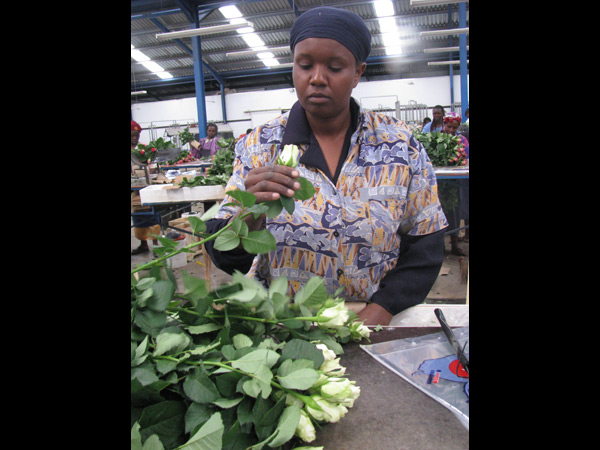"You look like a guy who buys flowers and arranges them himself" the florist said when I was scanning the shelves.
"I don't know about the arranging part, but, yes, I like to put them together in my own way" I replied.
To me, putting together the flowers that I buy is like the cooking that I do. I put together the ingredients, and it might not be anything that formally trained people do, but I have fun with it. I like how the food turns out. Arranging flowers is no different. And, I get that personal satisfaction of , "hey, I did this!"
She gave me a couple of suggestions and walked back to her counter, and I continued with staring the flowers. I was, yet again, amazed at how much I don't know. I didn't know the names of most of the flowers there. There were a couple of them that I was not sure whether they were even flowers at all--they were green! Yet, in the classroom, I pretend that I know stuff, and get paid for that!
I asked the florist about the green thingies, and she told me what they are called. I have already forgotten the names of those green thingies; I suppose that's how students are in my classes, too, eh!
"Hi there, neighbor" a voice said. "Are the flowers for a special friend?" she asked with a smile and twinkling eyes.
I hadn't talked with her for a while--in the cold and wet months, we neighbors are mostly strangers to each other. When the colors of the landsccaped and wild flowers burst upon us in the April spring, we too pop out of our homes and stay out and about, until the leaves turn red and brown and fall on the ground in November.
"Yes, but it is a sad thing. A friend who is not well." I quickly recapped the story.
"Those are tough. At my age, I shudder at those thoughts" she said. Understandable--she is more than two decades older than me.
"But, we have to do them. Your friend will appreciate it" she continued.
"Hey, what are you doing for lunch today?" I asked her.
"My daughter is coming over."
"Ok, we'll have lunch at my place sometime the week after" I told her.
"Oh, I would love that. Make your cauliflower dish; I like that one."
I reached the counter with the rest of the groceries in the cart. It was one of my favorite chatty clerks.
"Ooooh, is somebody in trouble, or what!" she laughed.
"I look like I am always in trouble, eh."
"You men always get into trouble" she laughed some more.
"Or, maybe he is doing the right thing" said the woman behind me in the line.
"Exactly, think positively that I am doing the right thing" I said.
Knowing enough about small talk means that we should also know when not to get into details. I gave no hints about how the flowers were to cheer up a friend.
Isn't not getting into details also the case when we ask people, "how are you?" In their lives, too, friends could be unwell. Maybe someone close to them died recently. Or, the pet dog is sick. Or they got fired from their job. But, they mask it all and reply with a smile "good. How are you?"
Rarely do we tell all. Sometimes a tad and, more often than not, we don't reveal anything about our own tragedies. Because, we innately realize that everybody has problems. We somehow manage and cope and survive.
And we know that flowers help. Even when not the best arrangement ever.
Since 2001 ........... Remade in June 2008 ........... Latest version since January 2022
Showing posts with label flowers. Show all posts
Showing posts with label flowers. Show all posts
Sunday, February 02, 2014
Wednesday, July 28, 2010
Stop and smell the roses
The caption for this photo reads:
"A Maridadi employee takes a moment to appreciate the flowers."
It is from an essay in Slate about Kenya's growing flower exports.
While blogging about the economics of flowers is not new here, this photo is new--the Kenyan employee appreciating and admiring the flower.
Sweet!
"A Maridadi employee takes a moment to appreciate the flowers."
It is from an essay in Slate about Kenya's growing flower exports.
While blogging about the economics of flowers is not new here, this photo is new--the Kenyan employee appreciating and admiring the flower.
Sweet!
Monday, May 31, 2010
Saturday, February 20, 2010
A Colombian export and Plato's cave
A follow-up to an earlier post on flowers and economics.
Last week a student, "J.", excitedly shared with the class that the bouquet of flowers she had bought from the store turned out to be from Colombia and not from any local nursery. She then gave me the barcode tag from that bouquet, which is what I have inserted here on the left after scanning it.
Of course, it is wonderful when students are able to experience for themselves the academic discussions we have in the classroom. My first ever experience with students giving me such feedback was back when I was in California. One student, whose name I still remember--Andrea--, was in my economic geography class where I had talked about table grapes as an example of an economic product that in modern times are able to transport over thousands of miles, with the result that grapes are available throughout the year in the grocery stores. Andrea's email, a couple of terms after the class ended, was a result of her excitement when it suddenly struck her in the grocery store that she was holding in her hands grapes that had been imported from Chile.
Once we understand a small part of the world, it is amazing how it never looks the same again. We then want to share that with others. In our own ways, and our own respective paths, we are all like those in Plato's cave. Will someone unchain me please, and confirm whether the shadows I see are really mashed potatoes? :)
Last week a student, "J.", excitedly shared with the class that the bouquet of flowers she had bought from the store turned out to be from Colombia and not from any local nursery. She then gave me the barcode tag from that bouquet, which is what I have inserted here on the left after scanning it.
Of course, it is wonderful when students are able to experience for themselves the academic discussions we have in the classroom. My first ever experience with students giving me such feedback was back when I was in California. One student, whose name I still remember--Andrea--, was in my economic geography class where I had talked about table grapes as an example of an economic product that in modern times are able to transport over thousands of miles, with the result that grapes are available throughout the year in the grocery stores. Andrea's email, a couple of terms after the class ended, was a result of her excitement when it suddenly struck her in the grocery store that she was holding in her hands grapes that had been imported from Chile.
Once we understand a small part of the world, it is amazing how it never looks the same again. We then want to share that with others. In our own ways, and our own respective paths, we are all like those in Plato's cave. Will someone unchain me please, and confirm whether the shadows I see are really mashed potatoes? :)
Saturday, January 30, 2010
Flowers, women, and economics
If ever I need an example of "wake up and smell the roses" I need to look no further than my intro class. One of the essays I assign to students in my intro class pretty much wakes them up to the reality of roses in the grocery stores here in the US having originated in Ecuador or Colombia. Most students are shocked, I suppose, that the roses did not come from some local nursery. One term a student commented something like "but, a rose is not like a factory product that can be shipped like this. It is a sentimental thing."
The market, I told her and the class, does not care much for sentiments.
So, reading this piece in The Hindu is not that much of a revelation--in terms of how much the boom in the flower business is a recent phenomenon in India. The boom is a reflection of affluence--barely subsisting people will rarely spend money on such goods.
The market, I told her and the class, does not care much for sentiments.
So, reading this piece in The Hindu is not that much of a revelation--in terms of how much the boom in the flower business is a recent phenomenon in India. The boom is a reflection of affluence--barely subsisting people will rarely spend money on such goods.
In most cities, the sudden boom seems to be a fairly recent phenomenon. “In the 1950s when we started the business, K.R. Market was handling less than a tonne daily. Today, it handles over five tonnes of loose flowers daily, and even breaches the 50-tonne mark during the festival and marriage season,” points out S. Nagabhushan, a wholesale flower seller in Bangalore. Tracing the history of flower market in Bangalore, he observes: “Bangalore was once known for flower production with a number of farms in the vicinity. But, the real estate boom has consumed these farms, and nearly 75 per cent of Bangalore's floral needs in loose flowers today is met by Tamil Nadu.”The workers down the economic ladder do not get appropriate benefits from participating in this industry. It is a problem that is characteristic of the informal economy.
If you thought that Rs. 100 a day was not bad for a flower seller, you would change your mind if you saw how that amount has to be fractioned — to pay for her two children's education at a good private school (Padma herself has studied only up to Std X while her older sister is a graduate); support her unsupportive, unemployed husband and his indulgences; a sister who just lost her job and her two children; and pay off her housing loan. It is indeed quite a strain on the low-margin profit she makes, but she manages and quite contently at that, though the tears that swell in her eyes when talking about the family seems to have a different story to tell…Again, as is almost the case among the poor all across the developing world, the women overwork, while the men sit around and do nothing. Or worse, they spend the money the wife earns/saves for the family--on liquor. I tell you, it is pretty disgusting for this blogger to admit that his fellow men can be quite a disaster.
Subscribe to:
Posts (Atom)




